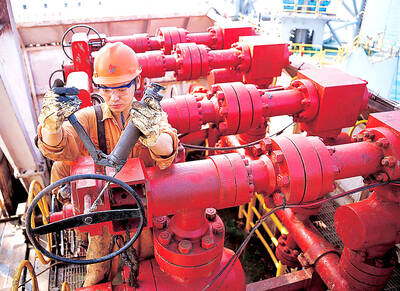Despite its idealistic sentiment, China’s Belt and Road Initiative is actually a ploy to gain political and economic control over other nations, thereby helping it achieve worldwide hegemony, academics said yesterday.
The Taiwan Association of University Professors yesterday held a forum on the initiative in Taipei.
The initiative, proposed in 2013, was meant to create demand for China’s excess production, which would otherwise be difficult for the Chinese government to use, said Chang Ching-hsi (張清溪), a retired National Taiwan University economist.
One of China’s means to achieve this is lending large sums of money to economically weak countries to help them build infrastructure, Chang said, adding that when indebted countries default on such loans, China pounces, demanding that they offer natural resources or control over their ports in return.
The Greek Port of Piraeus, which was sold to the Chinese state-run China Ocean Shipping Co in 2016, has become a Chinese haven for tax evasion and exporting knockoffs, Chang said.
By “squandering” cash overseas and inviting heads of states to summits about the initiative, China seeks to soften criticism leveled against it and gain political influence over other countries, he said.
While it would be difficult for China to generate profits from the initiative, that might be compensated by the political influence gained from it, Chang said, adding that Beijing’s ultimate goal is to supplant the US and become the world’s hegemonic power.
One of the goals China hopes to achieve with the initiative is to make the yuan a world currency, which is one reason it has so generously lent money to other countries, Soochow University economy professor Tsaur Tien-wang (曹添旺) said.
However, China has not succeeded in this regard, as exchange rates between the yuan and other currencies are not stable enough, which causes other countries to lack faith in the yuan, Tsaur said.
Furthermore, the yuan is not yet mature enough in terms of regulation of the financial market in the event of a financial crisis, which has also prevented it from becoming an international currency, he said.
Quoting Chinese President Xi Jinping (習近平) as saying in 2014 that China is a “peace-loving, amicable and civilized lion that has just awoken from its sleep,” former Presidential Office adviser Huang Tien-lin (黃天麟) said that the lion’s prowling near Taiwan, around the Diaoyutai Islands (釣魚台), in the South China Sea and on the border with India has contradicted that claim.
The initiative can lean on “three swords,” Huang said: China’s unparalleled ability to mobilize resources, which helps it overcome harsh climates and terrain when building infrastructure; the large influence China’s 1.4 billion population wields over business giants worldwide; and the country’s vastness means it is blessed with abundant natural resources.
US President Donald Trump is among a handful of national leaders who understand the threats posed by the initiative, and has initiated talks with Japan and the EU to develop a joint infrastructure program to counter the initiative, Huang said.

The Chinese military has built landing bridge ships designed to expand its amphibious options for a potential assault on Taiwan, but their combat effectiveness is limited due to their high vulnerability, a defense expert said in an analysis published on Monday. Shen Ming-shih (沈明室), a research fellow at the Institute for National Defense and Security Research, said that the deployment of such vessels as part of the Chinese People’s Liberation Army (PLA) Navy’s East Sea Fleet signals a strong focus on Taiwan. However, the ships are highly vulnerable to precision strikes, which means they could be destroyed before they achieve their intended

About 4.2 million tourist arrivals were recorded in the first half of this year, a 10 percent increase from the same period last year, the Tourism Administration said yesterday. The growth continues to be consistent, with the fourth quarter of this year expected to be the peak in Taiwan, the agency said, adding that it plans to promote Taiwan overseas via partnerships and major events. From January to June, 9.14 million international departures were recorded from Taiwan, an 11 percent increase from the same period last year, with 3.3 million headed for Japan, 1.52 million for China and 832,962 to South Korea,

SOVEREIGNTY: The rigs show that Beijing ‘rejects Taiwan’s jurisdiction’ by building in areas where Taipei demands permission to build or alter installations Chinese oil rigs have been sighted just 26 nautical miles (42km), from Taiwan’s exclusive economic zone (EEZ) near Pratas Island (Dongsha Island, 東沙島), posing a threat to Taiwan’s sovereignty if left unchallenged, a brief published by the Jamestown Foundation on Tuesday said. Pratas Island, 444km from Kaohsiung, is northeast of the South China Sea and houses a Taiwanese garrison. The brief, titled “Rigging the Game: PRC Oil Structures Encroach on Taiwan’s Pratas Island” — referring to the People’s Republic of China — analyzed photographs and said that Beijing’s tools to pressure Taiwan now include oil rigs. “Oil rigs now constitute part of Beijing’s

The Taiwan Experience Education Program (TEEP) has funded short-term internships in Taiwan for more than 4,500 young people from more than 40 countries since 2015, with the goal of attracting and retaining international talent, the Ministry of Education said yesterday. Fifty-five colleges launched 514 projects this year, including in fields such as semiconductors, artificial intelligence, medicine and biotechnology, green energy, and sustainability, it said. The program provides research and practical internships in Taiwan for two to six months, and offers cultural exchange and networking opportunities, the ministry said. For example, National Formosa University’s Embedded System and Autopilot Laboratory developed two solar-powered drones in